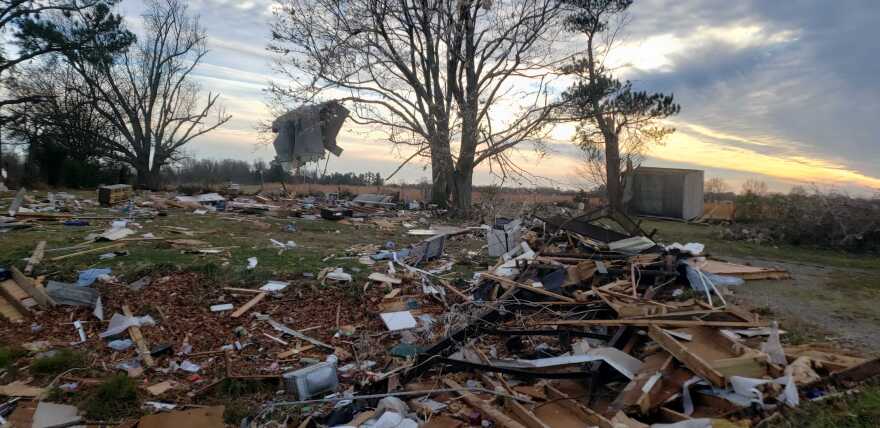As of Monday afternoon, Gov. Andy Beshear confirmed that 74 people from multiple counties were dead following what state leaders say was the worst tornado event in Kentucky history this past weekend.
There has been significant damage, with around 1,000 homes affected, and the search continues to find missing residents or identify those who have died.
David Houvenagle, a licensed clinical social worker and lead adult mental health therapist at University of Louisville’s Peace Hospital, said there can be both immediate and long-term trauma from disasters such as this, and offered advice for navigating the aftermath.
“I think the reality is…we’ve had that phrase over the last couple of years that ‘it’s OK not to be OK.’” he said. “I’d like to say ‘it’s OK to hurt. This was big.’”
Houvenagle said the first and short-term phase of dealing with a situation like this can be paralysis, shock and numbness, especially with significant loss. He said these are normal reactions, and that over the long term, people who have been through a disaster may become more guarded, irritable or angry.
Talking with others and being productive can help a person stay busy and provide a needed distraction from the rawness of the situation.
“I think right now the best thing is to be connected, stay connected, talk to people,” he said. “If you feel motivated to help, go and help.
“I think this kind of situation does produce in us some form of anxiety. Anxiety stimulates our adrenaline, adrenaline makes us want to move and we might need to move.”
He said if a person is unable to get out and help but is still feeling anxious, they might consider limiting the amount of media they’re consuming. That can help minimize feeling overwhelmed by the daily reminders of what is unfolding.
If you’re having a crisis right now, Houvenagle recommends reaching out to your local mental health agencies or crisis hotlines. A clergy member or other trusted person can also help.
If the feelings manifest into post traumatic stress –signs of which aren’t seen until maybe six months later – Houvenagle said that’s when finding a support group and seeking professional help can be a good idea.
“Your coping skills right now probably have to be distraction skills,” he said. “They need to be you helping, you being busy, you doing things that get your mind some place in a healthy zone. Be busy in your mind, be busy in your activity, things that are healthy and productive.”
Children may be especially vulnerable to the effects of a disaster, according to the National Child Traumatic Stress Network. Signs of distress in children 6 to 11 include withdrawing from peers, competing for attention with caregivers, difficulty concentrating, unwillingness to leave home and aggression.
Teens 12 to 18 may have physical pains in response to stress and also become withdrawn, aggressive, resisting authority or begin experimenting with drugs or alcohol.
To speak with a counselor to help with 24/7 emotional support, call the Substance Abuse and Mental Health Services Administration's Disaster Distress Helpline at 1-800-985-5990.
If you or someone you know is considering harming themselves, call the suicide prevention 24-hour helpline at 1-800-273-8255.
A running list of ways to help those impacted by the tornadoes can be found at wfpl.org.





